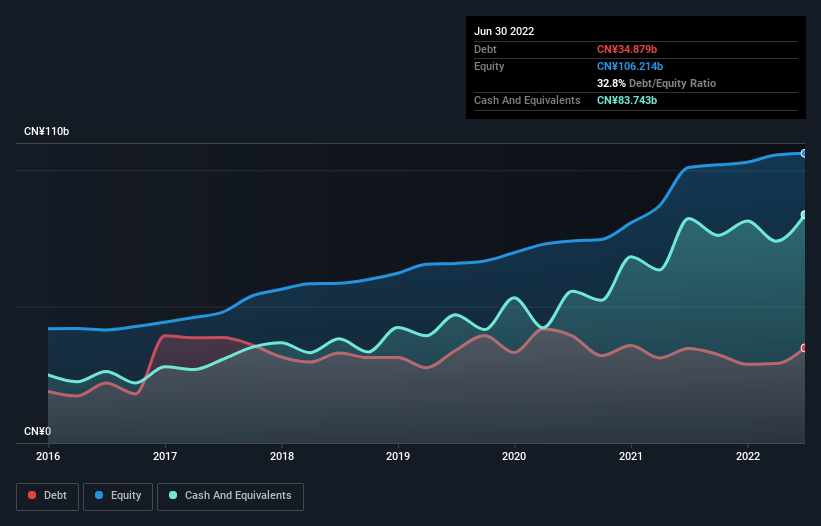Weichai Power (HKG:2338) Seems To Use Debt Quite Sensibly

Some say volatility, rather than debt, is the best way to think about risk as an investor, but Warren Buffett famously said that 'Volatility is far from synonymous with risk.' It's only natural to consider a company's balance sheet when you examine how risky it is, since debt is often involved when a business collapses. As with many other companies Weichai Power Co., Ltd. (HKG:2338) makes use of debt. But is this debt a concern to shareholders?
When Is Debt A Problem?
Debt is a tool to help businesses grow, but if a business is incapable of paying off its lenders, then it exists at their mercy. Ultimately, if the company can't fulfill its legal obligations to repay debt, shareholders could walk away with nothing. While that is not too common, we often do see indebted companies permanently diluting shareholders because lenders force them to raise capital at a distressed price. Having said that, the most common situation is where a company manages its debt reasonably well - and to its own advantage. The first step when considering a company's debt levels is to consider its cash and debt together.
Check out our latest analysis for Weichai Power
What Is Weichai Power's Debt?
As you can see below, Weichai Power had CN¥34.9b of debt, at June 2022, which is about the same as the year before. You can click the chart for greater detail. But it also has CN¥83.7b in cash to offset that, meaning it has CN¥48.9b net cash.

How Healthy Is Weichai Power's Balance Sheet?
Zooming in on the latest balance sheet data, we can see that Weichai Power had liabilities of CN¥124.3b due within 12 months and liabilities of CN¥59.5b due beyond that. On the other hand, it had cash of CN¥83.7b and CN¥48.7b worth of receivables due within a year. So its liabilities total CN¥51.4b more than the combination of its cash and short-term receivables.
This is a mountain of leverage even relative to its gargantuan market capitalization of CN¥75.4b. Should its lenders demand that it shore up the balance sheet, shareholders would likely face severe dilution. While it does have liabilities worth noting, Weichai Power also has more cash than debt, so we're pretty confident it can manage its debt safely.
It is just as well that Weichai Power's load is not too heavy, because its EBIT was down 68% over the last year. When it comes to paying off debt, falling earnings are no more useful than sugary sodas are for your health. When analysing debt levels, the balance sheet is the obvious place to start. But ultimately the future profitability of the business will decide if Weichai Power can strengthen its balance sheet over time. So if you want to see what the professionals think, you might find this free report on analyst profit forecasts to be interesting.
But our final consideration is also important, because a company cannot pay debt with paper profits; it needs cold hard cash. While Weichai Power has net cash on its balance sheet, it's still worth taking a look at its ability to convert earnings before interest and tax (EBIT) to free cash flow, to help us understand how quickly it is building (or eroding) that cash balance. Happily for any shareholders, Weichai Power actually produced more free cash flow than EBIT over the last three years. That sort of strong cash conversion gets us as excited as the crowd when the beat drops at a Daft Punk concert.
Summing Up
Although Weichai Power's balance sheet isn't particularly strong, due to the total liabilities, it is clearly positive to see that it has net cash of CN¥48.9b. The cherry on top was that in converted 117% of that EBIT to free cash flow, bringing in -CN¥3.1b. So we are not troubled with Weichai Power's debt use. The balance sheet is clearly the area to focus on when you are analysing debt. However, not all investment risk resides within the balance sheet - far from it. For example, we've discovered 1 warning sign for Weichai Power that you should be aware of before investing here.
Of course, if you're the type of investor who prefers buying stocks without the burden of debt, then don't hesitate to discover our exclusive list of net cash growth stocks, today.
Valuation is complex, but we're here to simplify it.
Discover if Weichai Power might be undervalued or overvalued with our detailed analysis, featuring fair value estimates, potential risks, dividends, insider trades, and its financial condition.
Access Free AnalysisHave feedback on this article? Concerned about the content? Get in touch with us directly. Alternatively, email editorial-team (at) simplywallst.com.
This article by Simply Wall St is general in nature. We provide commentary based on historical data and analyst forecasts only using an unbiased methodology and our articles are not intended to be financial advice. It does not constitute a recommendation to buy or sell any stock, and does not take account of your objectives, or your financial situation. We aim to bring you long-term focused analysis driven by fundamental data. Note that our analysis may not factor in the latest price-sensitive company announcements or qualitative material. Simply Wall St has no position in any stocks mentioned.
About SEHK:2338
Weichai Power
Engages in the manufacture and sale of diesel engines, automobiles, and other automobile components in China and internationally.
Flawless balance sheet, good value and pays a dividend.

